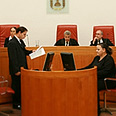
High Court rejects war inquiry petitions
One-vote majority of High Court judges rules against overturning PM's decision, will not force State-commissioned inquiry into war in Lebanon
"I am of the opinion that there is no catalyst which would require our intervention in the government's decision. The government had the right to establish a government inquiry committee," wrote Justice Eliezer Rivlin, who voted against the petitions, in his verdict.
However the slim majority didn't hide its criticism of the government either. Justice Rivlin hinted as much: "The government's behavior in general and its decision not to establish a State-commissioned inquiry in particular will also be judged by the public." Rivlin added that not-intervening does not signify approval of the government's decision: "The rejection of this petition does not constitute a 'kosher' stamp on the matter for the public. It does not relieve the elected officials of their obligation to the public. They will be held accountable for their actions by the voters."
Early in October the High Court instructed the State to explain its decision to not establish a State commissioned inquiry to investigate the war. The State responded five days later, saying that the manner in which the issue was investigated was legitimate and entirely reasonable. The State also claimed that the decision at hand was at the very heart of the expanse of issues given to the government's judgment.
'Need to investigate'
The government said that there was no substantial difference between the authority of the appointed Winograd Committee and the authorities that would be given to the State-commissioned inquiry.
The representative speaking on behalf of the attorney general's office told the court that the government was well within its rights to decide for or against the formation of a State-commissioned inquiry on any matter.
The political echelon had reached the conclusion that there was indeed a need to investigate the conduct of the State during the war, so that the lessons learned from such an investigation could be applied to any future conflicts.
The Winograd Committee therefore, the attorney general's office argued, will conduct a creditable, comprehensive and thorough examination of the state's conduct and will accordingly submit its findings and recommendations.










